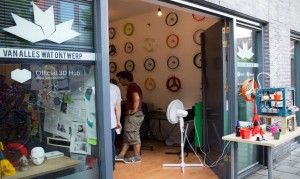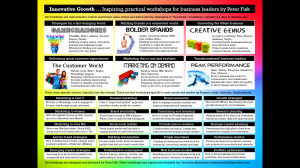
by Peter Fisk
$19 billion for WhatsApp might seem expensive, particularly compared to the $1bn also paid by Facebook for Instagram, and similarly by Google for YouTube. But with 450 million active users, 70% daily, a more global audience, and a commercial business model, the instant messenger could help to retain confidence in the $100bn social network. 37 year old Ukrainian co-founder Jan Koum is doubly happy. He grew $6.8bn richer in the same week that he watched revolutionary change in his hometown of Kiev.
In this issue, we also learn about Google X, and Facebook’s big rival Tencent.
100 million viewers across the globe sat down to watch this year’s Super Bowl. With marketer’s eyes focused on the $4 million 30 second ad slots, you could be forgiven for not realising that the Seattle Seahawks won. This year’s most recalled ads, by Chrysler and Coca Cola looked back and forwards. Whilst the Detroit car maker got Americans nostalgic with the help of Bob Dylan, Coke celebrated today’s multi-ethnic nation, where beauty lies in its diversity. It was a telling moment, when Madison Avenue convention was outgunned by crowd-sourced Atlanta vision.
But the real winners thought differently. Marketing is much than advertising, and marketers have realised they can make budgets go further, and engage people more deeply. Online competitions, over many months, created the real buzz. Dorito’s “Crash the Super Bowl Contest” challenged snack-loving fans to create their own ads, with a $1 million prize. In the business world, software brand Intuit offered their spot to others. Leading in the crowd voting was the National Organisation to Reform Marijuana Laws which was subsequently disqualified, creating even more coverage for them and Intuit.
Content marketing is where many brands are now focusing their imaginations. Beyond the superficial images and slogans of campaign-based advertising, today’s best content is authentic, relevant, topical, collaborative and evolving. Last year Oreo demonstrated the power of real-time marketing, tweeting “You can still dunk in the dark” moments after an unplanned power shortage. That takes empowered and agile marketing.
The majority of creative ideas don’t come from ad agencies but from consumers today, fuelling both innovation and communication, whilst experiences are collaborative and participative, rather than delivered in standardised and passive ways. Back at Coke, Jonathan Mildenhall and his creative team, have sparked a revolution with “liquid and linked” content, which works across audiences and platforms, fuelled by stories and topicality, personal and constantly evolving.

The Consumer Electronics Show is the moment tech-companies showcase their latest innovations. This year’s event in Las Vegas was dominated by wearable tech and 3D printing. Oculus Rift, the virtual reality headset, has been a long time coming, but is set to redefine possibilities of immersive gaming, and many other sectors too. In healthcare, for example, Intuitive Surgical has transformed the ability of doctors to perform automated heart surgery, faster, cheaper and more precise.
Personal healthcare is likely to transform our lives. From Jawbone to Nike+ we can already track our fitness, but Scanadu, with a clip-on monitor the size of a small coin, will soon allow us to check our blood pressure, and much more, as often as we check our mobile phones. Small and connected “internet of things” technologies will change everything. Geak is an intelligent ring, slots on your finger and controls your mobile phone through movement. Every marketer knows the power of “time and place” today, harnessing big data to pinpoint consumers when it matters most. When consumers take 2.6 seconds to choose a brand, every influence, and every second, can matter.
ChefJet stood out amidst the innovations in 3D printing for its ability to print your favourite food on demand, particularly now that multi-substance printing is possible. It looks like a microwave, but it could transform shopping and eating, diet and lifestyle. Time to buy your own 3D printer? Not quite. Far better to visit your local branch of 3DHubs, the Dutch company is launching “maker spaces” in every big city, either branded shops or individuals sharing their own printers, creating new communities of entrepreneurs. Amsterdam leads the world with over 500 locations.

From Alibaba to ZaoZao, China is where our future is rapidly being shaped. Jack Ma’s e-commerce platform already connects most of the world’s businesses, making size and distance irrelevant. Vicky Wu’s pre-sumer fashion site allows huge numbers of “new middle” consumers to choose from a huge selection of designs before they are made, giving many new designers their chance to shine. Xiaomi, the Android-based smartphone brand, led by rockstar CEO Lei Jen, sold out the first batch of 100,000 MiPhones (not iPhones) in 83 seconds last October. In his first year of business he sold 7.2 million devices, and Xiaomi is already regarded as a $10 billion company. China’s real skill is in creating new business models for new markets. Once the Chinese learn to build emotional brands, Apple and Google, even Coke, should be worried.
Fast Company’s “Most Innovative Companies 2014” rankings are inspiring as always. Google leads the way, largely thanks to the moonshot-thinking round the corner from the Googleplex, where its
Back on Fast Company’s list, most interesting was the non-profit organisation which took second place. Bloomberg Philanthropies is making a bigger difference to the world than even Bloomberg, through a new business model for charities that engages companies in solving big problems. Like Google, it seems that big brands are realising that a purpose beyond profit, about how they can make life better, really does drive new thinking. But it doesn’t require a charity, the best brands, like Toms, can do both.
Also in the top 10 innovators is Airbnb, the start-up rent-your-room website that has recognised that facilitating the connections between people is far more powerful than with the business itself. As the flagship of “collaborative consumption” it offers every business a new idea for making money – utilising spare capacity, encouraging people to share, sustaining revenues through renting. On Zilok, the peer to peer rental site, you can rent out the drill you bought and never use, the car that only moves at weekends, or even your drive when you’re not at home. Collaboration is human, good for the world, and more social and fun. Having stayed in too many sterile and same hotels around the world, I definitely think Airbnb offers travellers a more interesting place to stay.

Sochi’s Winter Olympics took place under warm blue skies, and cost more than any other sporting event in history. The tagline just seemed to capture the over-hyped excess, which turned cold soon after. Sponsors have found it tough too. Coke’s personalised name machine was hijacked by demonstrators, as was the Olympic hashtag used by McDonalds. You can’t hide your true beliefs in a connected world! Brands should be careful when connecting themselves with vanity projects of oil-rich nations, whilst sports bodies should remember that they are built on the passions and goodwill of everyday fans.
Skates, skis and snowboards will soon be replaced by screaming engines and burning rubber as Sochi becomes the venue for Russia’s first ever F1 Grand Prix. Indeed the park’s real destiny was to accommodate the night-time spectacular. F1 sponsors say a lot about the sport. Gone are the tobacco brands, replaced by Red Bull’s adrenalin, a host of telecoms brands from Telefonica to Vodafone, and most recently India’s Tata Communications, trying to be known for fast tech too. But then, if they all are?
My new book “Gamechangers: Are you ready to change the world?” has been quite a personal journey and is coming soon. Most interesting was interviewing the 100 companies nominated by business leaders as those who are “shaking up” their markets. Most recently I learnt about Beauty-In, the Brazilian cosmetics-embedded drinks and candy maker, and Supercell, the tablet-centric games developer from Helsinki. What matters is what we can learn from their strategies and experiences. That’s in the book!
Last month I found myself working in the desert mountains between Dubai and Oman, and at Disneyland Paris. In Hatta, UAE, I was running a week long leadership retreat for Almansoori. The challenge for leaders was how to be better – not just as a team, which is where we usually focus, but individually too. Having done your Belbin profile and practised your Covey habits, how can you really be a better leader? The real skill is to amplify the potential of others. In Paris, working with SAS Institute, Disney are making everyone’s experience better, with a $1bn investment in big data to create MyMagic.
Next month I’m in Istanbul launching the first Gamechangers online competition of the year. Maybe someone will rival last year’s winner Aeromobil, the amazing flying car from Slovakia. I’ll also be exploring the future world of printing with Canon in Munich, getting customer-centric in banking with Santander in Madrid, plus trips to Beunos Aires and Moscow coming soon. Here are some more examples of my workshops helping you to develop better ideas, and to make them happen:

MASH+UP is a quarterly round-up of new ideas and anecdotes by Peter Fisk who is a bestselling author, keynote speaker and expert consultant. He is founder of GeniusWorks, helping companies to develop more innovative strategies for brands and marketing. He was recently nominated to Thinkers 50 Guru Radar, and is visiting professor at IE Business School, Madrid. His new book “Gamechangers: Are you ready to change the world?” will be published in 2014.

Thinkers50 Limited
The Studio
Highfield Lane
Wargrave RG10 8PZ
United Kingdom

Thinkers50 Limited
The Studio
Highfield Lane
Wargrave RG10 8PZ
United Kingdom
| Cookie | Duration | Description |
|---|---|---|
| LANG | 9 hours | Linkedin set this cookie to set user's preferred language. |
| nsid | session | This cookie is set by the provider PayPal to enable the PayPal payment service in the website. |
| sp_landing | 1 day | The sp_landing is set by Spotify to implement audio content from Spotify on the website and also registers information on user interaction related to the audio content. |
| sp_t | 1 year | The sp_t cookie is set by Spotify to implement audio content from Spotify on the website and also registers information on user interaction related to the audio content. |
| tsrce | 3 days | PayPal sets this cookie to enable the PayPal payment service in the website. |
| x-pp-s | session | PayPal sets this cookie to process payments on the site. |
| __cf_bm | 30 minutes | This cookie, set by Cloudflare, is used to support Cloudflare Bot Management. |
| Cookie | Duration | Description |
|---|---|---|
| l7_az | 30 minutes | This cookie is necessary for the PayPal login-function on the website. |
| Cookie | Duration | Description |
|---|---|---|
| CONSENT | 2 years | YouTube sets this cookie via embedded youtube-videos and registers anonymous statistical data. |
| _ga | 2 years | The _ga cookie, installed by Google Analytics, calculates visitor, session and campaign data and also keeps track of site usage for the site's analytics report. The cookie stores information anonymously and assigns a randomly generated number to recognize unique visitors. |
| _gat_gtag_UA_10408481_1 | 1 minute | Set by Google to distinguish users. |
| _ga_ZP8HQ8RZXS | 2 years | This cookie is installed by Google Analytics. |
| _gid | 1 day | Installed by Google Analytics, _gid cookie stores information on how visitors use a website, while also creating an analytics report of the website's performance. Some of the data that are collected include the number of visitors, their source, and the pages they visit anonymously. |
| Cookie | Duration | Description |
|---|---|---|
| NID | 6 months | NID cookie, set by Google, is used for advertising purposes; to limit the number of times the user sees an ad, to mute unwanted ads, and to measure the effectiveness of ads. |
| test_cookie | 15 minutes | The test_cookie is set by doubleclick.net and is used to determine if the user's browser supports cookies. |
| VISITOR_INFO1_LIVE | 5 months 27 days | A cookie set by YouTube to measure bandwidth that determines whether the user gets the new or old player interface. |
| YSC | session | YSC cookie is set by Youtube and is used to track the views of embedded videos on Youtube pages. |
| yt-remote-connected-devices | never | YouTube sets this cookie to store the video preferences of the user using embedded YouTube video. |
| yt-remote-device-id | never | YouTube sets this cookie to store the video preferences of the user using embedded YouTube video. |
| yt.innertube::nextId | never | This cookie, set by YouTube, registers a unique ID to store data on what videos from YouTube the user has seen. |
| yt.innertube::requests | never | This cookie, set by YouTube, registers a unique ID to store data on what videos from YouTube the user has seen. |
| Cookie | Duration | Description |
|---|---|---|
| DEVICE_INFO | 5 months 27 days | No description |
| loglevel | never | No description available. |
| m | 2 years | No description available. |
Thinkers50 Limited has updated its Privacy Policy on 28 March 2024 with several amendments and additions to the previous version, to fully incorporate to the text information required by current applicable date protection regulation. Processing of the personal data of Thinkers50’s customers, potential customers and other stakeholders has not been changed essentially, but the texts have been clarified and amended to give more detailed information of the processing activities.